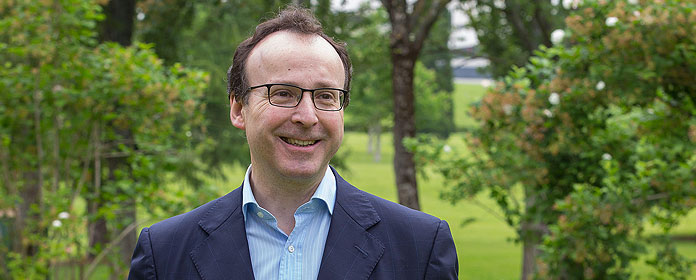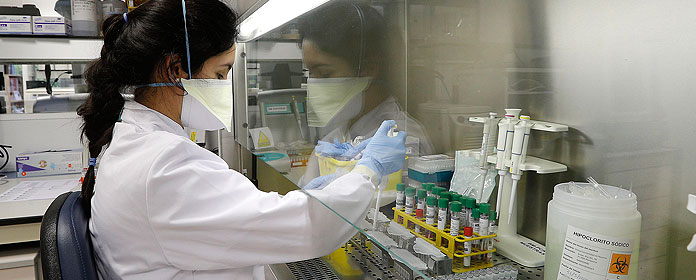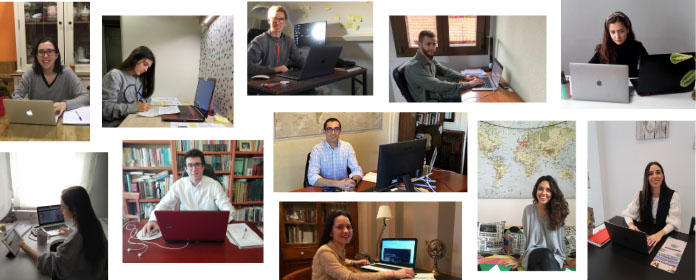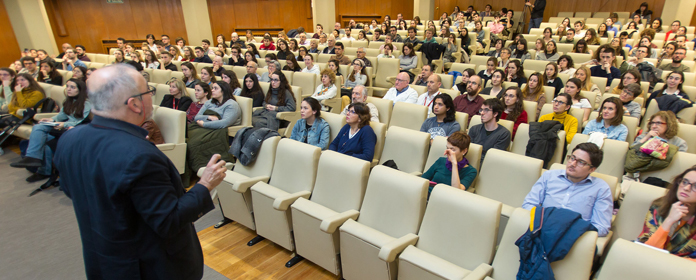Pablo Sánchez-Ostiz, Vice President: "Personalized teaching and counseling are going to be more important than ever".

Within the plan C by the University of Navarra for the next academic year, two possible scenarios are proposed: face-to-face classes with social distancing, or face-to-face classes with part of the students at classroom and the others receiving the teaching in other places. In any case, one of the fundamental axes will be innovation in teaching. The Vice President of Office of Academic Affairs, Pablo Sánchez-Ostiz, reveals some of the new developments in this interview
How has the experience been professor in the last three months?
We have experienced an exceptional time and the reaction of the professionals and students has also been exceptional. Logically, we have had problems and we have identified improvements but the commitment of the teachers has been extraordinary. They have tried to provide the teaching with the highest quality, prioritizing health and personal situations. The students have also behaved with great responsibility in the midst of serious difficulties. In moments like these you realize the exemplary commitment of the people.
What teaching scenarios are contemplated for the next course?
We are carefully analyzing the evolution of the disease and, at all times, we will follow the health recommendations. With the current data , it is prudent to manage two possible scenarios from September onwards: face-to-face classes with social distancing or face-to-face classes with a reduced issue of people in the classroom and other people, depending on the circumstances, receiving the teaching in other places.
And how is that done?
In March we changed in a sudden way thanks to commitment and effort. But now we want to build a model with method: introducing listening with surveys to teachers and students, reflection with experts, planning with the centers and training with the services. At final, we want to live this status as an opportunity to continue improving our teaching. We will have difficulties and limitations, let's not deny it. But it is also an opportunity to adapt our teaching: to combine the presentiality of the class magistral with other teaching methodologies that seek an integral development of the student, without the need to share a common space. There are many didactics that we have implemented and we know that they work: team-based learning, reverseclass (the student prepares the class), service learning, case resolution, cooperative learning...
It seems that we are heading towards a small format teaching ...
Yes, it is a teaching in small groups, where the student acquires a greater protagonism and the teacher tutors their learning with a new leadership. Personalizedteaching and mentoring are going to be more important than ever. And here we have another new opportunity: to take advantage of our knowledge and experience in personalized attention , from teacher to student. With the appropriate measures, this model is compatible with our Philosophy of "living the campus", with classes, conversations with teachers and students, cultural life, solidarity, etc....
What decisions have been made to configure the teaching of the programs of study of Degree?
In order to provide security in these scenarios, it has been decided to maintain the teaching plans and the distribution of timetables. It has also been reduced to 5 hours per ECTS credit (credit ) the load of teaching physical presence (in the classroom, for the student). The purpose of these measures is goal not to increase the load of work of the professor or student. We will be able to take advantage of the unoccupied hours to carry out other activities remotely (synchronous or asynchronous classes, seminars, remote work, case studies, etc.).
What role do the centers play in this change of scenario?
The centers play a fundamental role and have been working very well for weeks now. Groups of work have been formed to organize the new teaching, with the redesign of subjects, with a network to support teachers, in coordination with the services to exchange experiences, solve problems and share solutions. It is time for shared leadership to put commitment above uncertainty.
What advice would you give to a teacher to tackle teaching next academic year?
I would invite teachers to live this time with realism, flexibility and a desire to have fun. I personally have learned a lot from my colleagues and students. I also suggest that, with imagination and talent, we reinvent the way we teach teaching. This crisis has taught us that the solution is not technological: the digital teaching has limits. We have learned that the core topic is to rely on technological tools (ADI's Virtual classroom , Google Meet, Panopto...) but overcoming them with new didactics. There are many and very varied, which adapt well to a style professor own, according to the characteristics of each teacher and subject.
What financial aid will the teachers be counting on?
Both the centers and the services are working on a plan of financial aid to the teacher. The Quality and Innovation Service will provide a three-week plan from June 1 to training to teachers and staff of administration and services; the Library Services and Eunsa are at the disposal of the centers to create electronic resources for subjects and manuals; IT Services is designing the technological needs plan; Campus is analyzing the new space conditions so that the teaching is the most appropriate.




